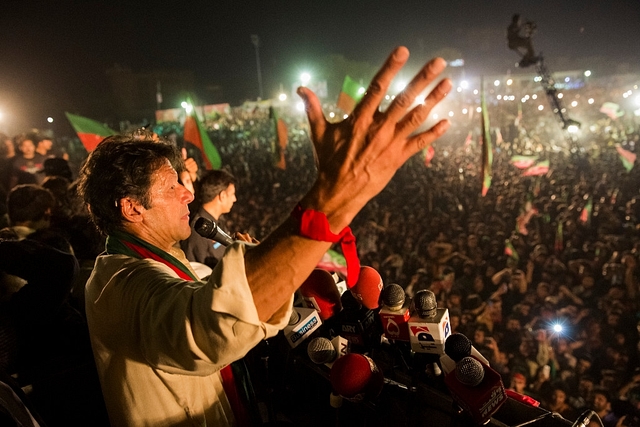
As Islamists Call For “Ghazwa e Hind” Post Article 370 Abolition, A Look At The Term’s History And Meaning
Ghazwa-e-Hind, translated to “Holy War Against India” is a term mentioned in several Hadith, authoritative books of Islamic jurisprudence. The term refers to the prophecy that the land of Hindustan will be conquered by Islamic forces, the subjugation of non-believers, and states that those who participate in this bloody war against infidels will be granted free and faster entry to the paradise as compared to ordinary Muslims.
Recently, as the tensions soared between India and Pakistan after abrogation of Article 370, the terms is being shared widely across the social media prophesying the destruction of the infidels, and establishment of Islamic rule over India.
The debates in Pakistan parliament, among Pakistani scholars as well as panellists in TV debates are full of the reference to the term, even calling for open violence against Hindus.
The term entered into limelight after the Islamist groups, especially those based in Pakistan began using it to invoke Jihad against the Hindu-majority nation. Hafiz Saeed of JuD, Masood Azhar of JeM, LeT and several other Islamist groups keep using the term to provoke Muslims, especially Muslims living in India to wage a jihad against the idol-worshippers.
Interestingly, the promotion of Ghazwa-e-Hind came to bite back Pakistan as several terrorist groups like TTP use the term to include the whole of South Asia, including Pakistan. Deeming the Pakistani state as anti-Islamic or not enough Islamic, the goal of the groups is to topple Pakistani government, take over its army and nuclear weapons, win the Ghazwa-e-Hind, and establish Shariah law and pure form of Islam in the Indian subcontinent.
The “Ghazwa-e-Hind” and its usage by Pakistan to claim a special status in the history of Islam as the prophesied conqueror of India has many detractors.
Many Indian Muslim scholars argue that the prophesy has been already fulfilled by the Muslim rulers who invaded India in the medieval age. They also debate the authenticity of the Hadith and reject its repeated contemporary citation as “Pakistani terrorists’ anti-India propaganda.”
The scholars also note that several influential ulema, like Shah Waliullah in the 18th century, had not used the term, even in latter’s invitation to Afghan ruler Ahmad Shah Abdali to invade India to check the rise of infidels like Marathas.
However, the historical genocide of the Hindus by the Islamic rulers- the temples being razed to the ground, mass killings, loot and plunder, abduction, rape and forced conversions provide ample fodder to the Islamist groups to inspire young men into joining their mission against the “infidels”, believing in Ghazwa-e-Hind.
Many foreign travellers, several from the Muslim world like Ibn Battuta have written about the persecution of infidels in gory details. Several Islamist movements in India in the 19th and 20th century also derived inspirations from these and promoted and justified violence against Hindus.
While Shah Waliullah may not have referred to the prophesy of Ghazwa-e-Hind in his letter to Abdali, his works advocating strict subjugation of the non-believers, hatred towards idol-worshippers and preventing any power to them make the question of authenticity of the Ghazwa redundant.
Hatred towards ‘idol-worshippers’ remains mainstream, even celebrated in Islamic discourse. The attempt, if not to glorify, is to minimise or suppress the damage caused to the native inhabitants of India by invaders, as is visible form the little to no attempts to counter the Hindu hatred unleashed online after the abrogation of Article 370.
The bigotry of the faceless social media users as well as the mainstream Pakistani politicians, scholars and celebrities derives heavily from the language of Islamic scriptures.
In such a situation, the veracity of “Ghazwa-e-Hind” becomes marginal even as its usage remains popular. It is clear that any attempt to contain the hatred against Hindus and radical Islam will have to go beyond questioning the authenticity of terms like Ghazwa-e-Hind, and instead directly confront the long, painful history of Hindu persecution in the subcontinent.
Such an attempt would also entail the difficult task of de-mainstreamising of the hatred against idol worshippers in Islamic scholarship. The connect of Madrassa education and terrorism, which Pakistani scholar Azmat Abbas talks about, is clearly visible in their common language of Hindu hatred. The task becomes formidable in the face of the fact that major Abrahamic religions, aside from the long history of conflict among themselves, remain united in the contempt for “idol-worshippers” and polytheism.
As terrorist groups like Al Qaeda, Islamic State etc increasingly focus on the South Asian Muslims, Pakistan ups its ante on the Kashmir front, and United States comes closer to a deal with Taliban, it becomes pertinent to control the spread of extremism and Hindu hatred, a task which needs to be performed proactively. With Pakistani state openly sponsoring both, the roots of terrorism have become intertwined with the history and culture of the subcontinent. Terrorism is not merely a security/law and order problem.
India will have to face the tough questions regarding the historical crimes against Hindus, widespread and mainstreamed Hinduphobia to effectively tackle the spread of terror group propaganda in the country. India can no longer afford to buy peace at the cost of selective amnesia.